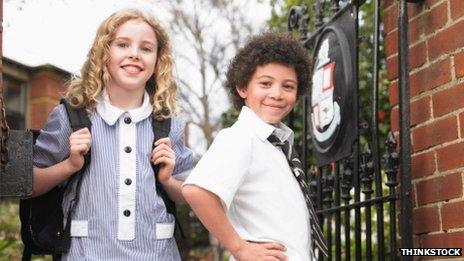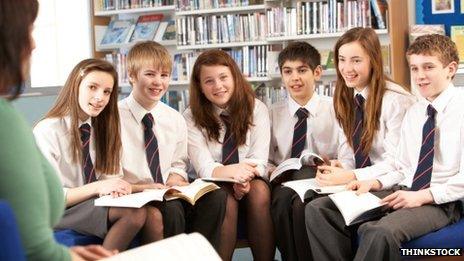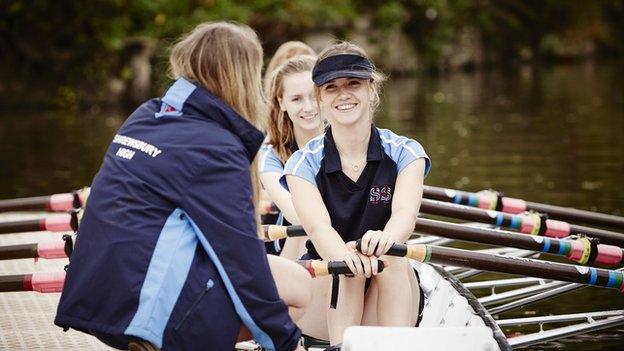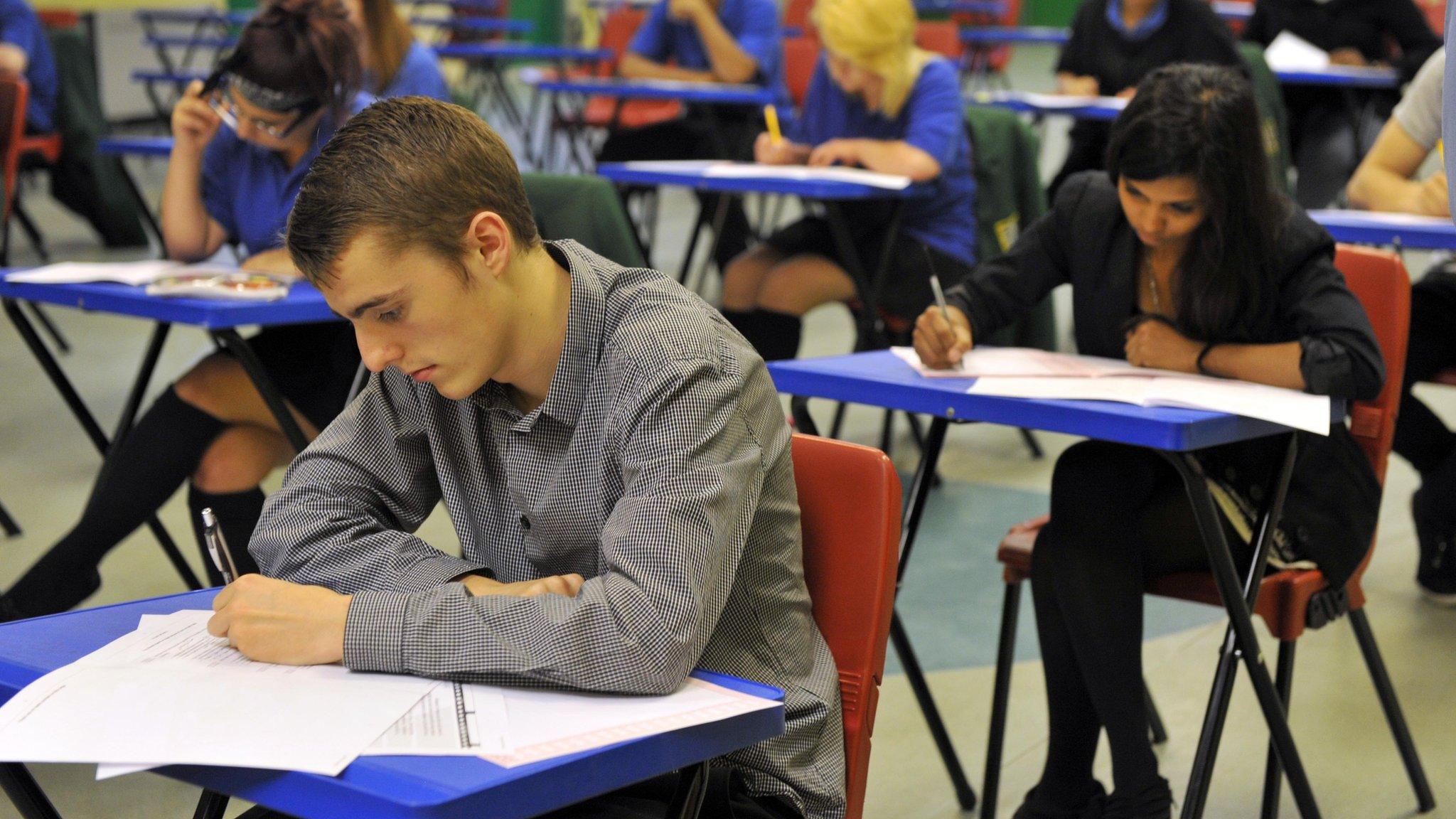'Salary premium' for private school pupils
- Published

The report says better educational achievement is key to the findings
UK children who are privately educated are likely to earn almost £200,000 more between the ages of 26 and 42 those in state schools, research finds.
The Social Market Foundation (SMF) study suggests that a significant "wage premium" exists for those who attend fee-paying schools.
It says this may be because these pupils are more likely to get good exam results and to go to a top university.
Ministers say reforms are "closing the gap" between rich and poor.
About 7% of children in the UK are educated at independent schools.
The SMF research uses data from the British Cohort Study, which tracks a representative sample of the UK population born in a specific week in 1970.
The findings indicate that between the ages of 26 and 42 someone who attended a private school will earn around £193,700 more, on average, than an individual educated at a maintained school.
A former private school pupil earns, on average, about 43% more per hour at the age of 34, about 35% more at 38 and 34% more at 42, it says.

The study suggests that even when a child's parental background and their test scores at age 10 are taken into account, there is still a "substantial earnings premium", with a private school pupil earning an estimated £57,653 more between the ages of 26 and 42 than a similar child who went to a state school.
The researchers conclude that, while a range of factors may have an impact on earnings, better educational achievement plays a major part.

Private education
About 7% of children in the UK are educated privately
The Independent Schools Council, which represents about 90% of private schools in the UK, listed 511,928 pupils at 1,257 schools in their 2014 census
In 2010, 35% of MPs had attended independent schools
In 2007, 54% of chief executives of FTSE 100 companies, 51% of top medics, 54% of leading news journalists and 70% of High Court judges had been privately educated
A 2011 Sutton Trust report found 48% of independent school pupils were accepted into the 30 most selective universities, compared with 18% for comprehensive schools and the average for all schools being 23.8%
The same report showed that 5.2% of independent school pupils were accepted into Oxbridge, compared with 0.8% for comprehensive schools and with the average for all schools 1.8%.
Source: The Sutton Trust

The report says: "Those who go to independent schools are more likely to get good A-levels, more likely to get degrees and to get them from the most selective universities.
"Not only are their educational outcomes better but, on the best available evidence - value-added scores - independent schools (on average) progress their children more during their school years than state schools."
Emran Mian, director of the SMF, said the results were not just because these children tended to come from privileged backgrounds.
'Inequitable'
"Take two people of the same ability at age 11 and with the same parental background, track them forward, and the pupil who attends independent school is likely to earn substantially more," he said.
"A significant driver appears to be simply that independent schools typically progress the education of pupils more during their school years than state schools. On this basis, limiting the opportunity to attend independent schools to those who are able to afford the high fees seems inequitable."
The SMF findings come in a report assessing a proposal by the Sutton Trust that children should be admitted to independent schools on academic ability alone, rather than on their family's capacity to pay fees.
The trust's Open Access scheme proposes that participating schools should receive the same funding per pupil as local state schools, but charge fees on a means-tested basis, with the poorest families paying nothing.

The Sutton Trust wants private education to be open to children of all backgrounds
Extending the scheme to 100 leading independent schools, covering 62,500 pupils, would cost the government about £215m per year, the study estimates.
It says that if the initiative were introduced, with pupils selected on merit rather than ability to pay, the social make-up of these private schools would change radically.
'Recruit once again on merit'
The number of children coming from the top 10% of household incomes would roughly halve, while the proportion of children coming from the bottom 40% would more than double.
Sir Peter Lampl, chairman of the Sutton Trust, said: "This report clearly sets out the advantages that can be gained from a good private education.
"We need to open those opportunities to more young people, transforming the independent sector to ensure that successful day schools recruit once again on merit rather than money.
"Forty years ago, most of the best independent day schools in this country were open to children of all backgrounds. Today, unless your parents can find £12,500 a year after tax, access is by and large denied."
But the National Union of Teachers described the Open Access scheme as "complete nonsense".
General secretary Christine Blower said: "Social mobility will not be addressed by sending a few students from poorer backgrounds to independent schools.
"A five-year study in 2010 commissioned by the Sutton Trust and government showed that students from comprehensive schools are likely to achieve higher-class degrees at university than independent and grammar school students with similar A-levels and GCSE results.
"In March the Higher Education Funding Council tracked 130,000 students beginning degrees in 2007 - the results showed that state pupils were more likely to get a 2:1 than those who had been privately educated."
A Department for Education spokesman said: "Our reforms are closing the gap between the rich and poor and allowing thousands more children to go to good state schools.
"There are now a quarter of a million fewer pupils in failing secondary schools than there were in 2010, and more young people from disadvantaged areas in England are applying to university than ever before."
- Published20 June 2014

- Published26 June 2014
